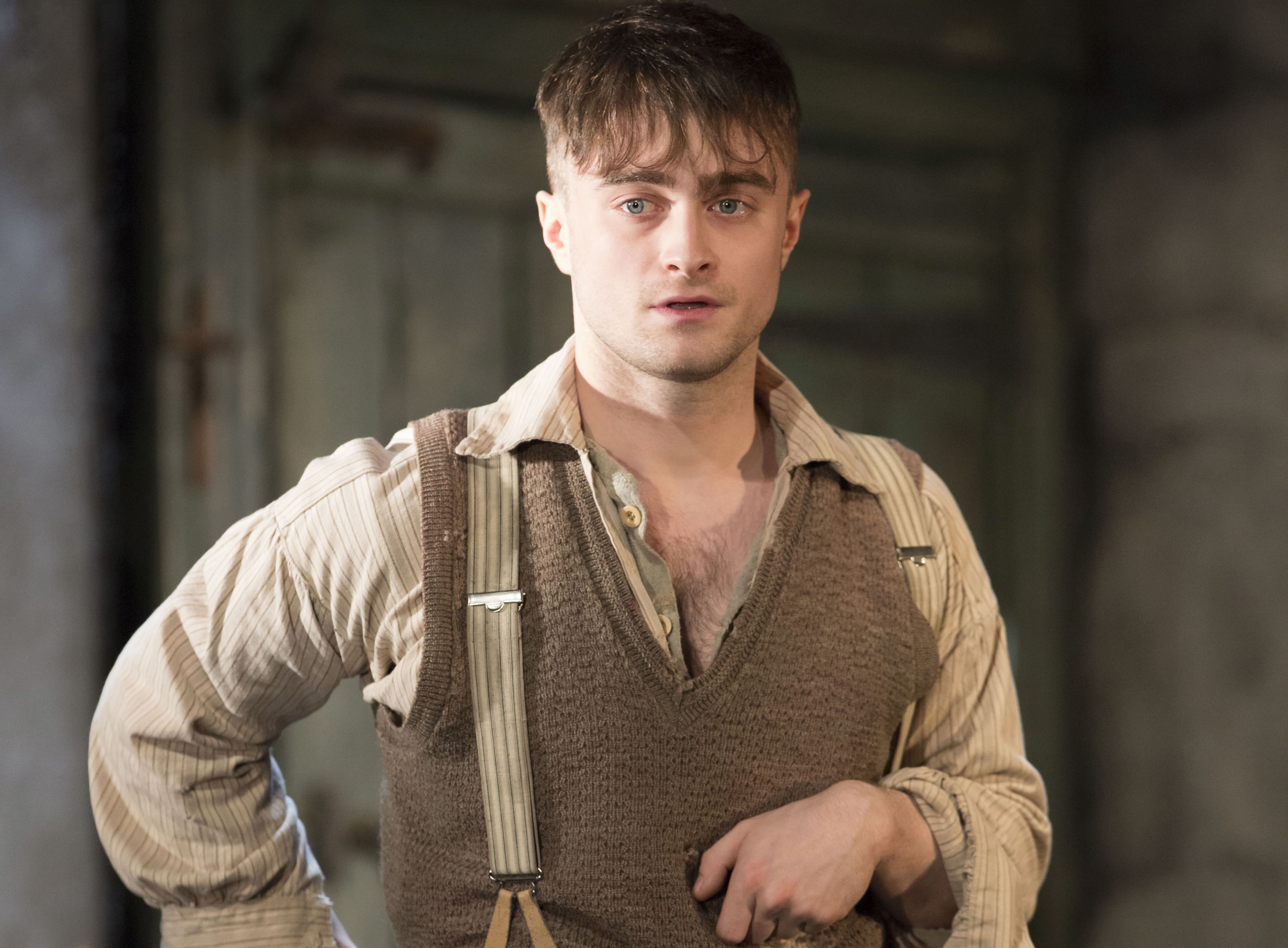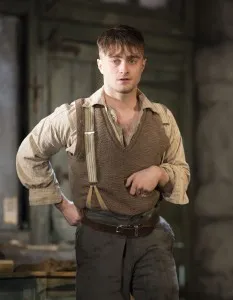
Don’t be fooled by the title and the posters featuring Daniel Radcliffe’s handsome face: Martin McDonagh’s “The Cripple of Inishmaan,” recently revived by the Michael Grandage Company at the Cort Theatre in New York, is an ensemble piece, although much of the action centers around the mysteries of Cripple Billy (Daniel Radcliffe).
Set in the damp, remote town of Inishmaan in 1930s Ireland, it’s a town so small and bleak the locals will cling to anything that suggests it’s a good place: “Ireland can’t be such a bad place if a German fellow wants to come here.” That line gets repeated throughout by almost every character, with many different types of people inserted, including a colored fellow.
The play is populated with the townsfolk, some onstage – like Billy’s aunts Eileen (Gillian Hanna) and Kate (Ingrid Craigie) Osborne who raised him, the foul-mouthed and feisty Helen (Sarah Green) whom Billy is sweet on, and the town gossip Jonnypateenmike (Pat Shortt) – and some offstage.
McDonagh draws us into this town’s world by slowly revealing the town lore. Every little detail, like an early story about the town slut, gets referred to again in later scenes for comedic effect, now that we’re in on the joke. There are many characters we never see, but we hear so much about them that we still feel like they’re people we could know.
When the play begins, Jonnypateenmike is attempting to sneak eggs away from the Osborne sisters who run a local grocery shop in exchange for his rarely newsworthy news. But this time, he has a real gem: Some people from Hollywood are going to be in Aran tomorrow shooting a film, “Man of Aran.”
It takes him eons to get this out, so intent is he on remaining the center of intense attention. Along the way, they discuss the Osbornes’ adopted son, the orphan, Cripple Billy, who has the odd habit of staring at cows for hours. They lament that this weird behavior can only hurt his already slim chances at finding a mate (they’re hoping for someone ugly and thick).
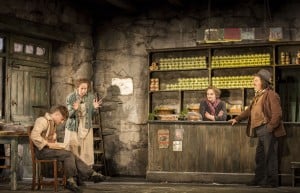
By the time we meet Billy, we’ve already heard a lot about him, and as becomes increasingly clear throughout the play, this is hardly the full story. Radcliffe’s Billy is crippled on the left side: He can’t bend his left leg when sitting, he limps across the stage and his left arm is always resting in an awkward position. It’s an impressive feat of physical work, always consistent and believable: Radcliffe must have, by now, one incredibly strong left quad or some very steep physical therapy bills.
When Billy enters the shop, he sits quietly, observing, while Jonnypateenmike — and later Helen and her sweets-obsessed brother, Bartley (Connor MacNeill) — talk, often throwing multiple insults at Billy in one breath. It may seem like Radcliffe isn’t doing much but listening, but look carefully. He’s quietly seething, desperately holding back tears, suffering silently. Billy is a born actor, which makes it unsurprising that he’ll eventually manage to make his way to Hollywood.
Billy may start out seeming like a victim and our heart bleeds for him, but he’s hardly the helpless person that his handle, Cripple Billy, might suggest. He’s well-read and adept at witty comebacks, though he often chooses to stay silent instead. He also proves to be a skilled manipulator. Eventually, he finds a way to meet the Hollywood folks, and before he knows it, gets sent back to America to star in a film about a cripple.
Before long, we learn that Billy can spin quite the web of tales, especially where the local town brute and widow, Babbybobby (Pádraic Delaney), is concerned.
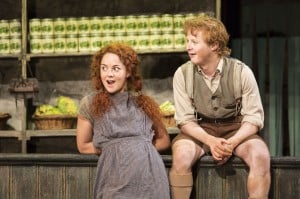
Did Billy lie to get on Babbybobby’s boat headed toward the film crew? Did Billy have success in Hollywood? If so, why did he come back and lie about it? Can we really believe that he was passed over for, in the play’s most “meta” line, an able-bodied person who can act and pretend to be crippled, rather than a cripple who can’t act? Hasn’t everything we’ve seen up to this point suggested that Billy is a skilled and practiced actor?
Further complicating this is a standalone scene in which Billy, sickly and delirious with tuberculosis, shakes and shivers, crying out in anger and pain. Is this real? Or is this his screen test? If it’s his screen test, he’s damn convincing.
While Billy is in America, we spend much more time back in Inishmaan, where his eccentric aunts are fretting about his disappearance and lack of contact. Eileen copes with her stress by binge-eating sweets, leaving little in stock for when the discerning and exasperating Bartley drops by to make a purchase. Kate, the bigger eccentric, repeats in constant shock that Billy left with “not a word” and returns to her old habit of talking to stones. Helen gets herself into a bit of trouble by constantly throwing eggs at people when her job is to deliver the eggs. And Jonnypatteenmike continues to try to kill his mother with drink and spread more gossip. Meanwhile, rumors abound about what happened to Billy.
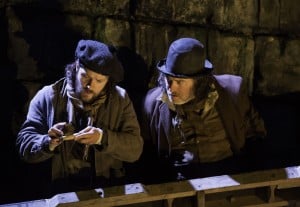
Daniel Radcliffe has said before that when you’ve got a play as good as “The Cripple of Inishmaan,” all you really have to do is not fuck it up. There’s quite a bit of truth to that.
This is a hilarious play, a human comedy about a quirky cast of characters that are more familiar than they are foreign. It’s also a dark comedy, because there’s pain everywhere: in the poverty of this nowhere town, in the story still unknown to Billy of how his parents died and in the mean spirit in which gossip, especially about Billy, spreads.
Radcliffe, who recently gave a sensitive performance as the young Allen Ginsberg in “Kill Your Darlings,” is excellent again here: from his flawless Irish accent, to his technically difficult and perfect physicalization of Billy’s crippledom and illness, to his impeccable comic timing and his genuine emotion that is always on display.
But this is not a one-man show, and there’s not a single weak link in this very, very strong cast of mostly Irish actors. They nail the comic timing, as well as the deeper emotions that each character feels. It’s a terrific production of an excellent play, and one of the best shows I’ve seen this year.
